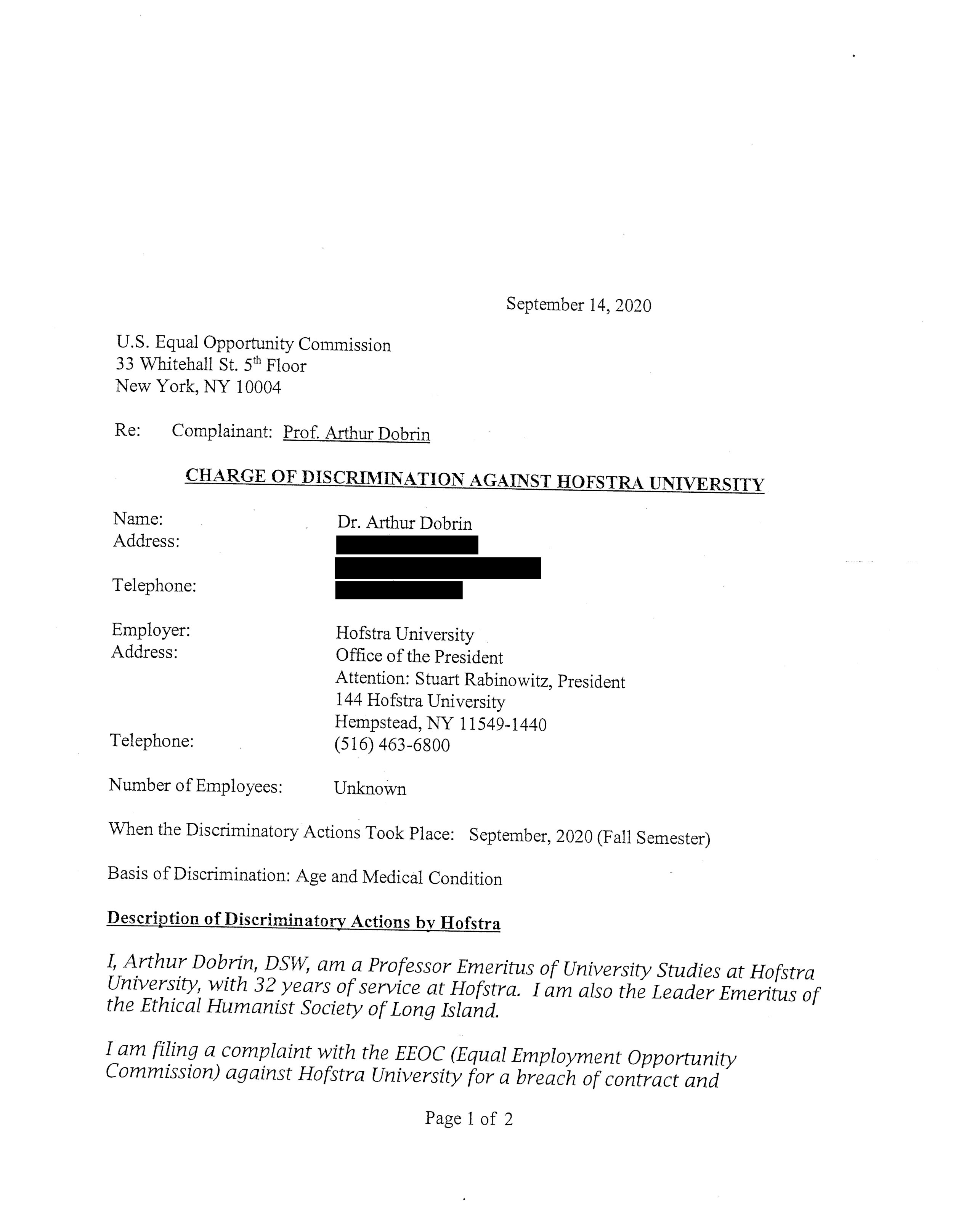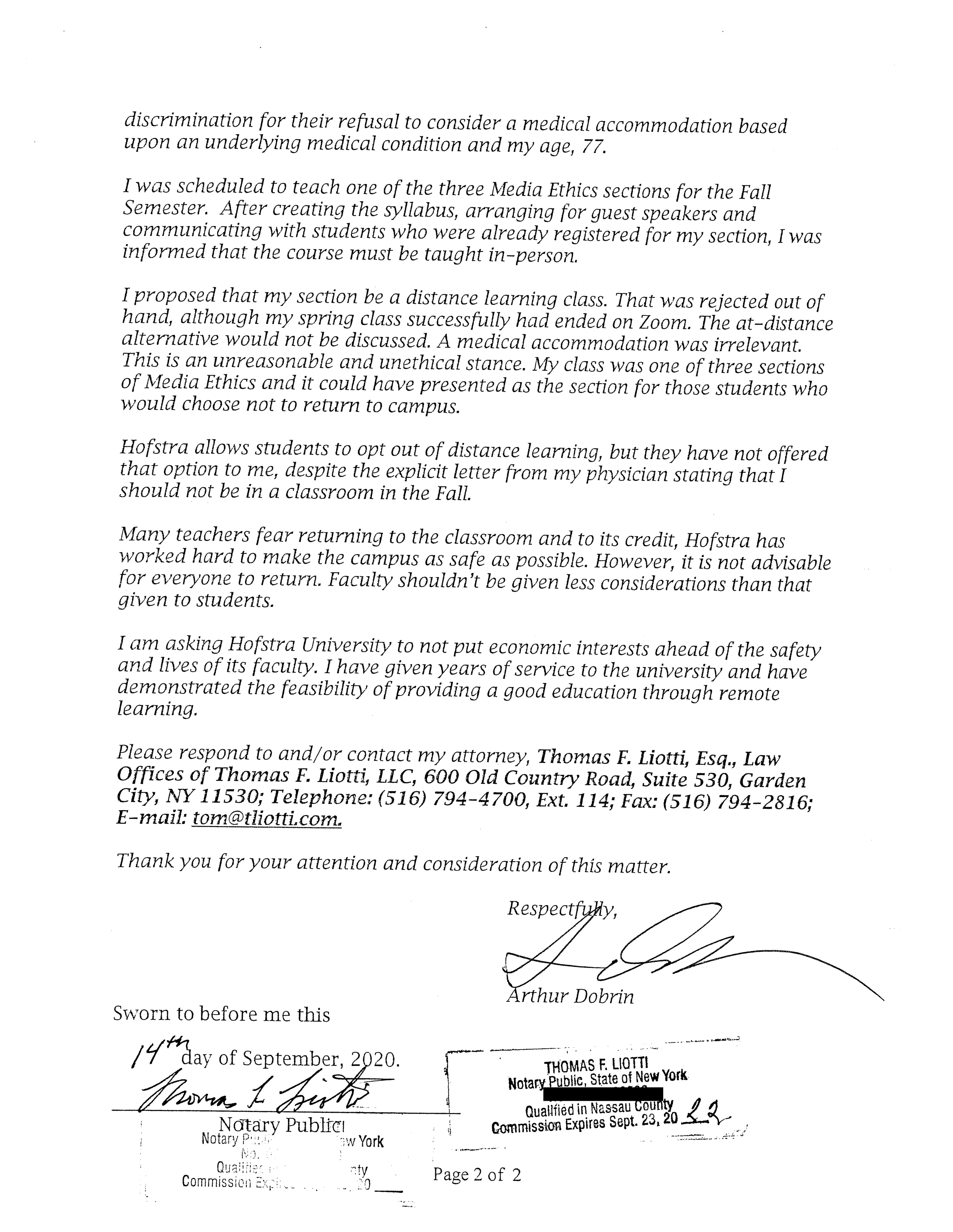Hofstra Professor Files Discrimination Complaint After Remote Teaching Request Was Denied
BY: LEAH CHIAPPINO AND AMUDALAT AJASA
(Feb. 24, 2021) — Hofstra Professor Emeritus Arthur Dobrin, 77, has filed a complaint with the Equal Employment Opportunity Commission (EEOC) against the university after they denied him the ability to teach his media ethics class remotely, despite what he says was a reasonable medical accommodation request amid the pandemic.
The complaint, which was filed with the EEOC on Sept. 14, accused the university of “breach of contract and discrimination” on the basis of age and medical disability. Dobrin retired from his full-time position six years ago, however, he has been consistently teaching media ethics as an adjunct since then.
“Many teachers fear returning to the classroom, and to its credit, Hofstra has worked hard to make the campus as safe as possible,” Dobrin wrote in his complaint. “However, it is not advisable for everyone to return. Faculty shouldn’t be given less considerations than that given to students.”
“I am asking Hofstra University to not put economic interests ahead of the safety and lives of its faculty,” he continued. “I have given years of service to the university and have demonstrated the feasibility of providing a good education through remote learning.”
In addition to his own health concerns, Dobrin says he thought a remote option for the class could help remote learners. “That way those students who didn't want to come back on campus and wanted to take the course at least would have an option and then [the university] said no, no discussion, it’s not possible to discuss this,” Dobrin told The Clocktower.
“It was really hardly even my decision once my doctor said to me, ‘you're crazy,’ [to go back to teaching in person],” he said.
As first reported by Anton Media Group, Dobrin says his physician sent two letters requesting medical accommodations to the university prior to the start of the fall 2020 semester, but he says he didn’t receive a response to either. After he had assembled a Blackboard page, scheduled guest speakers and communicated with students, university officials notified him that his request for accommodations had been denied.
A spokesperson for Hofstra told The Clocktower that the university hadn’t been served the complaint and couldn’t speak about specifics of the situation; they did, however, emphasize that the university scheduled classes either in-person, hybrid or online by considering the educational needs of students and academic programs.
“The emphasis for undergraduate classes, especially introductory classes, as well as lab and studio courses, was on in-person classes, while graduate classes were more online,” the statement read. “And in any event, class assignments are never based on the age of a professor.” The spokesperson declined to specify which faculty member or department made the decision in Dobrin’s case.
Dean of the Lawrence Herbert School of Communication Mark Lukasiewicz and Journalism Department Chair Jeffrey Morosoff declined to comment for this story.
Dobrin had been teaching media ethics, an introductory discussion-based journalism course, for the last decade when the pandemic struck during the spring semester. He said that despite initial concerns regarding the feasibility of online learning, he felt the course went well.
Dr. Elisabeth Ploran, head of the Hofstra chapter of the American Association of University Professors union, told The Clocktower the union attempted to advocate for Dobrin when contacted in late July, but their reach was limited given that he was an adjunct. She also said Dobrin was aware that his courses would be in-person for the fall when he agreed to teach them in March of 2020, closer to the start of the pandemic. While Dobrin does have a contract with the university, it does not guarantee him a course.
Ploran added that the university set a certain number of courses that they wanted to have in-person, and that the department chair had agreed to give him a larger room in order to make teaching in person safer. She said the union had been having difficulties getting the school to agree to move any classes online and that administration has been suggesting alternative options to faculty, such as taking a leave of absence.
During the fall semester, media ethics was offered with two in-person sections and one hybrid section, according to the Hofstra course catalog. The hybrid section was taught by Nicole Clarity, a full-time assistant professor in journalism, public relations and media studies. She told The Clocktower that she had also requested a medical exemption from the classroom due to a high-risk medical status, which was approved after she got a note from her physician.
However, Clarity says the university wanted “courses that typically have freshmen students in them to be in-person so incoming students would get a better sense of the Hofstra experience.” She compromised with the school and agreed to hold slightly over half of the class sessions in person. Clarity said the remote portion of the course worked well. “It was not detrimental to the learning experience to have these discussions online,” she said.
Meanwhile, for the spring 2021 semester, the course is offered in two fully in-person sections and one remote section. The faculty member teaching the remote section of the course, Peter Goodman, is a full-time professor of journalism and communications at the university. “I did not choose to be remote. It was scheduled by the university,” he said in an email to The Clocktower. “[Professor Dobrin] is a wonderful teacher and I am very sorry that this has happened to him.”
“This makes it especially galling,” Dobrin said, in response to the remote course afforded to his colleague. “It was as though [the university] had been dealing with a stranger or a professor they were looking to get rid of.”
Dobrin said that he would be open to returning to teach in person once the pandemic is under control. “I love teaching,” he said. “I love being in the classroom.”
“I loved Professor Dobrin’s class,” said junior journalism major Shayna Sengstock, who took Dobrin’s media ethics class her freshman year. “He taught us how to voice our own opinions and back them up with facts. He also taught us about the ethics concerning journalism. He was able to inspire people to pursue their careers by bringing in relevant guests.”
In addition to teaching, Dobrin, an ethicist, is the author of more than 25 books, as well as a Psychology Today blog focused on ethical issues. A former Peace Corps volunteer in Kenya, he and his wife, Lyn, still work to provide scholarships for Kenyan students. He is the Leader Emeritus of the Ethical Humanist Society of Long Island.
If the complaint is not addressed, Dobrin’s attorney Thomas Liotti tells The Clocktower says they plan to escalate the case to federal courts.




